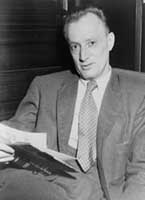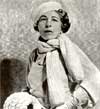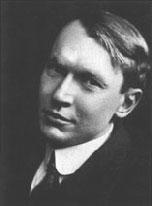
William J Bahr
Born: 1947 in Hays, Kansas
Pen Name: None Connection to Illinois: Bahr lives in the Chicago area. Biography: Bill Bahr is a retired telecommunications executive. A graduate of West Point, he served in the U.S. Army Signal Corps, working in Germany, Cambodia (the U.S. Embassy in Phnom Penh), and Korea before moving into commercial telecommunications. Along with earning three masters degrees and two patents, Bill held marketing/sales directorships at major corporations. His work helped spark the revolution in facsimile machines and the build-out in cellular systems and the internet, with both Bill and his products receiving many public accolades."Now volunteering in a number of community service organizations, Bill is an active participant in Rotary, VFW, and CHARACTER COUNTS!, where he has served in various leadership roles. In his spare time, Bill unabashedly admires George Washington. The new book George Washington's Liberty Key is a result of Bill's curiosity and extensive reading about Mount Vernon's Bastille key and the extraordinary, enabling, and ennobling character of George Washington. Bill lives in Chicagoland. You can find out more about his research at www.LibertyKey.US
Awards:
Website: http://www.LibertyKey.US
William J Bahr on WorldCat: http://www.worldcat.org/search?q=William+J+Bahr
Selected Titles
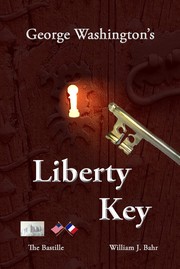 |
George Washington's liberty key : ISBN: 1537323377 OCLC: 966450807 "This book is about the most interesting key ever made, which now hangs in the central passageway of George Washington's Mount Vernon mansion, helping to greet over a million visitors a year. The main key to the Bastille prison in Paris, it was given in 1790 to Washington, the patriarch of liberty, by his missionary, the Marquis de Lafayette, who took the "sacred fire of liberty" he discovered in America and tried to fan its flames in France. Become a history detective and find out how this unique key was made, how the man who made it helped kill a king, and how it made its way to Mount Vernon. Along the way, learn about the interesting and unexpected twists and turns made in unlocking the doors hiding the truth about the key, which some (incorrectly) argue is a counterfeit. Then learn what Washington and Lafayette each believed was the "key" to establishing and maintaining liberty, and what went right and wrong in their respective revolutions. Finally, learn how the key continues to inspire a world-wide devotion to freedom." |
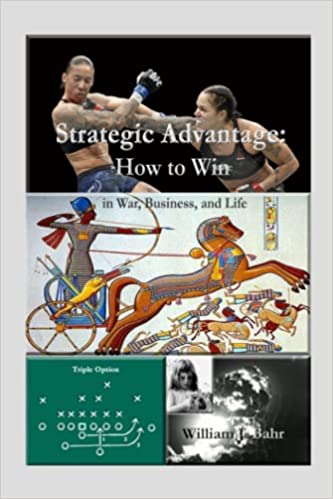 |
Strategic Advantage: How to Win in War, Business, and Life ISBN: B0B6XL6FNP OCLC: Independently published 2022 Strategic Advantage is a collection of powerful, winning techniques from the time of Troy to today. It covers a wealth of strategic principles for war, business, politics, games, martial arts, and life in general. It also includes a compelling section on ethics. The book first mines a wide range of information from master strategists, then refines them into principles of “strategic advantage” that allow one to better understand “how to win” in almost any situation. This insight-filled book unveils powerful moves to win most anytime, anywhere. Written by a successful corporate director and West Pointer, it makes protecting yourself much easier! The essence of winning can be distilled from principles common to all successful human action. Of many actions open for examination, two are highly important: competition and cooperation. Studying competition yields insights on winning in fights for rights or interests. Studying cooperation brings skill at winning in groups with shared goals. To cover these subjects, you can sift through the books of master theorists from Sun Tzu, through Machiavelli and Clausewitz, to Drucker and Deming. You can also read about master practitioners from Ulysses, through Napoleon and Lee, to modern-day captains of industry and esteemed statesmen. To aid you in such effort, this book tries to unearth, consolidate, and integrate,the works of these master strategists. Distilling the essence of competition and cooperation, it reveals the universal rules of winning, those simple yet critical formulas which change a situation to your advantage. In doing so, it crystallizes the powerful methods of attack and defense for your use in virtually any application. The book surveys the following theorists, theorist-practitioners, and practitioners: Adolphus, Alexander the Great, Alger, Ali, Alinsky, Bezos, Bodhidharma, Boyd, Brady, Caesar, Carnegie, Clausewitz, Collins, David, Deming, Dibella, Drucker, Federer, Ferrazzi, Fischer, Foch, Ford, Frederick the Great, Giap, Grant (Charles), Grant (Ulysses), Griess, Hanashiro, Hannibal, Hatmaker, Hitler, Ho/Minh, Iacocca, Jackson, Jobs, Johnson, Jomini, Jordan, Kaliher, Kano, Kasparov, Kotler, Krzyzewski, Lee (Bruce), Lee (Robert), Leonidas, Liddell Hart, Longhurst, Lowe, MacArthur, Machiavelli, Maginot, Mao, McDonough, Morgan, Napoleon, Nunes, Odysseus/Ulysses, Ogilvy, Pandolfini, Patton, Pelé, Porter, Rameses II, Rockefeller, Ross, Rubenstein, Schlieffen, Schultz, Schwarzkopf, Sherman, Shotoku, Smith, Steinitz, Sun Tzu, Travis, Trotsky, Ueshiba, Von Neumann, Walton, Warden, Washington, Wellington, William the Conqueror, and Winter. |
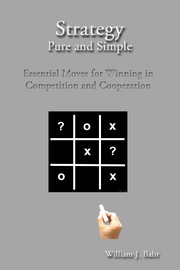 |
Strategy pure and simple : ISBN: 1986671054 OCLC: 1050365531 This insight-filled handbook unveils powerful moves to win most anytime, anywhere. Includes highly effective tactics for ethically winning in competition and cooperation, whether in politics, business, war, sports, games, martial arts, or general life. Not a fall-off-the-log easy read, but a theoretical work that clears the deck of anecdotes to reveal the potent basics. Best used as a ready-reference to prompt general solutions when confronting specific problems. Written by a noted innovation developer and corporate director. The essence of winning can be distilled from principles common to all successful human action. Studying competition yields insights on winning in fights for rights or interests. Studying cooperation brings skill at winning in groups with shared goals. To cover these subjects, one can sift through the books of master theorists from Sun Tzu, through Machiavelli and Clausewitz, to Drucker and Deming. One can also read about master practitioners from Ulysses, through Napoleon and Lee, to modern-day captains of industry and esteemed statesmen. To aid such effort, this "philosophy of strategy" tries to unearth, consolidate, and integrate the works of these master strategists, revealing the universal rules of winning, those simple yet critical formulas that change a situation to one’s advantage. In doing so, it crystallizes the powerful methods of attack and defense for use in virtually any application, helping to change strategy from art to science and making protecting oneself much easier. Because developing strategies often means devising better options, the author includes his handy new idea generator: “Instant Productivity: 101 Ways to Create.” |


